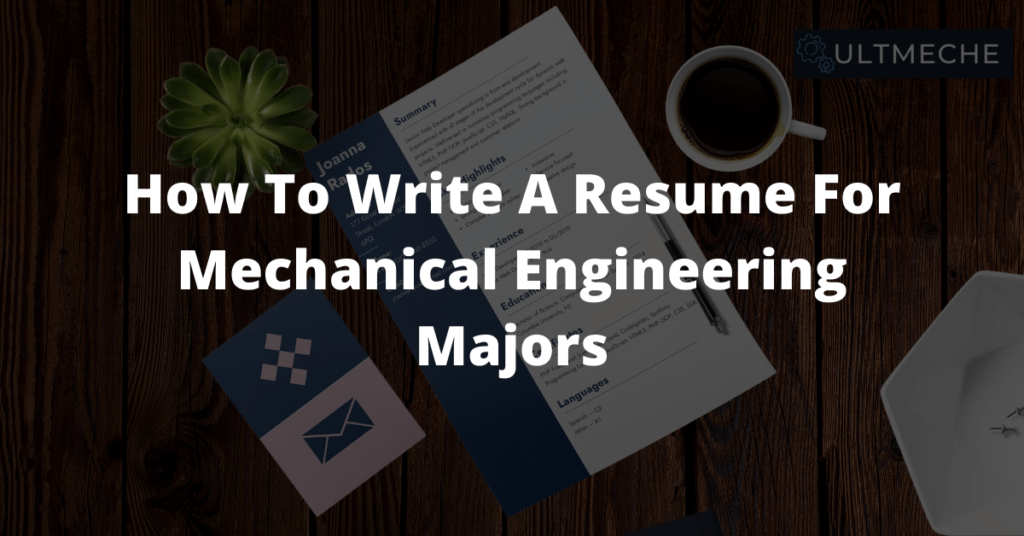
We’re going to be breaking down how to write a resume for mechanical engineering majors. This includes what sections to put, how to order them, and how bullets need to be portrayed onto your resume.
Unfortunately, engineering school does not teach how to effectively write a mechanical engineering resume, so we’re going to bridge that gap in knowledge.
Below you’re going to see a sample mechanical engineering resume template, how each relevant section is broken down, what type of information you need to include, and a video to summarize it in real time.
February 29, 2024Mechanical Engineering Resume Breakdown
Example Format
The format of your mechanical engineering resume should be something simple. Don’t make it something like one of those modern millennial type of formats, as there is too much going on with those.
At a minimum, mechanical engineering resumes need the following sections:
- Education
- Experience
- Additional – Technical Skills, Awards, Certifications
Additionally, your mechanical engineering resume should consist of The Big Three:
- Is clear and concise
- Contains keywords relevant to the job description
- Displays quantitative results and accomplishments
Use the above as an example.
If you need a review on your resume, check out: Mechanical Engineering Resume Review
Experience
For mechanical engineering students, if you have experience, place this on top. If you don’t have experience, place education first.
Experience includes, but is not limited to
- Engineering Internships
- Engineering Jobs
- Retail Jobs
- Sales Jobs
- Jobs at a grocery store
- Jobs at a restaurant
- Cashier or clerk
If you have experience, but don’t feel that it is relevant? Put it in there.
Having a job, while going to school shows a few things:
- That you can wake up and go to work on time
- Take on the responsibility of being both an employee and a student
- Ability to juggle a heavy work load (School and work is a lot!)
These are also a few bullet points you can reiterate in your interview. A lot of being confident in an interview involves being confident in yourself.
Don’t think “Am I good enough?”
Instead, think “Is the company good enough for me?”
Education
If you’re a student and do not have any experience, whether it is an engineering related internship or a job, place education at the top of your resume.
If you do have experience, place experience at the top of your resume, then education.
Education should consist of:
- University
- Major
- GPA (If above 3.0 specify, if below do not specify your GPA)
- Relevant Coursework
More content on university to follow.
Mechanical Engineering Projects
A big one that employers are focused on and if you don’t have experience, you will get asked about this.
Projects include those group projects from your CAD classes, thermodynamics, fluid mechanics, kinematics, statics, and etc.
Employers will ask about these projects so make sure you contribute and get as much value out of doing these projects.
If you do these projects correctly, you tie in theory and application, which is what employers look to see in students.
The formulas you cover go over the theoretical portion and the software used is what the application consists of.
You need experience to get experience, but projects are also a means to get experience.
Mechanical Engineering Memberships
Memberships show participation and involvement in extracurriculars outside of the classroom.
The best clubs for engineering are:
- Society of Automotive Engineers
- American Society of Mechanical Engineers
- Tau Beta Pi Engineering Honor Society
Society of Automotive Engineers
Get into SAE because Employers love to see engineers in the Society of Automotive Engineers.
Benefits of Society of Automotive Engineers, you will:
- Meet very talented and sharp students.
- Learn a ton about CAD and the application of your courses.
- Learn people skills from dealing with engineering personalities
- Participate in Formula or BAJA SAE
American Society of Mechanical Engineers
Not as important as SAE, but participate in this club if you can. You will have networking opportunities that will help you land a job. Industry-wide specifications also refer to ASME standards as well. Also great to add ASME from a keyword standpoint.
Tau Beta Pi Engineering Honor Society
If your grades are among the top 10%, you will get an invite to this membership.
Take this membership as it’ll be a great opportunity to network and meet likeminded individuals.
Skills
CAD
You will need to know CAD. As an engineer, you will need to know how to communicate your designs clearly and CAD is the universal tool to do so. Software includes ProEngineer, Creo Parametric, SolidWorks, AutoCAD, and many others.
Data Acquisition
Tools such as LabView, Simulink, and MATLAB.
You will very likely have experience in these software through your mechanics of materials, vibrations, and lab classes.
Software is very prevalent in the industry, so make sure you know how to use them!
Microsoft Office
Nowadays, it is similar to asking if you can read or write. Include Microsoft Office in your resume as these are other keywords that the job application will require.
Certifications
Sometimes, I like to think certifications are a piece of paper that show you’re competent, but nevertheless, include them in your resume.
Include
- Engineer-In-Training
- Professional Engineer
- Project Management Professional
- Six Sigma Green or Black Belt
About the author

Kazuyoshi Fujimoto, PE
Founder | Engineering Career Coach | Principal Mechanical Engineer
Kazu oversees all of ultmeche’s engineering services. He provides consulting such as resume reviews, rewrites, mock interviews, and all services career related. Additionally, Kazu performs consulting work regarding Oil & Gas, Automotive, and Aerospace & Defense. Kazu is licensed as a professional engineer in the state of California and has 9+ years of experience in Oil & Gas, Automotive, and Aerospace & Defense.

11 thoughts on “How To Write A Resume For Mechanical Engineering Majors”